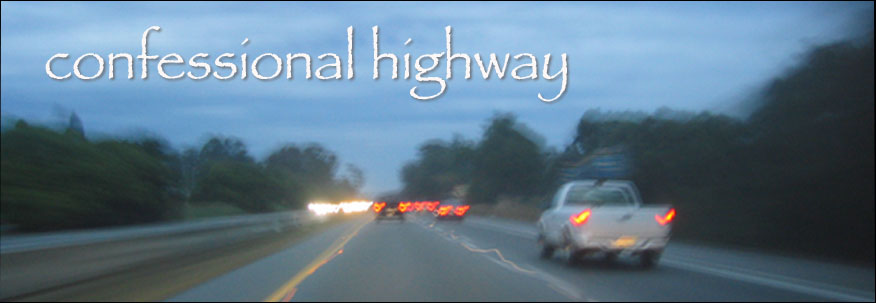Last night I dreamt about my college boyfriend, not because I’m being wistful or nostalgic, and not because of anything metaphysical and spiritual. He arrived in my dreams because I ran into his unbeknownst-to-me ex-wife, and in response to my simple, “
What are you doing here? I thought you lived up north,” she blurted out that she and my ex have been divorced for ten years, that they’d both remarried – him to the prison guard of his girlfriend (I must clarify that!) – and that he has lost his license to practice medicine.
Picture my jaw hitting my chest. Literally. Envision teeth and tongue, and my gaping mouth spewing shock and awe. It couldn’t have been pretty. Unable to mask my curiosity, I whipped out a pen and said, “We have to talk.”
“Oh, you had no idea?” she asked.
“Uh, no.”
I'd lost touch with them years back following their move and my misplacing their change of address card. By that point, our friendship had been reduced to an exchange of Christmas cards. It was natural to let it slide.
She gave me her number and trust me, I will call. This is the woman who immediately followed on my heels after my breakup with said boyfriend. He and I ended on good terms. We recognized we were heading in seriously different directions (I obviously had no idea to what extent! Prison guard of girlfriend? I
must clarify that sentence.) Boyfriend and I cried through our breakup discussion, dissecting if we were really through, if his journey into medicine and mine into the arts were at the core of our growing lack of understanding of one another, if his need to rise at dawn and my need to roam clubs of music and film and performance and poetry had to be so at odds. The pain of saying good-bye drained the air from the room.
One year later, he invited me to his wedding. His wedding. ‘
Gee, that was fast,’ I thought to myself. ‘
Is the paint even dry on my new apartment?’
But that was just figure of speech. He and I had never lived together. I did move months after our breakup – for reasons completely unrelated to my relationship status – yet not into an apartment but a group home. No, not
that kind of group home. The kind that every neighborhood dreads – five previous strangers living under one roof where every room in the house becomes someone’s bedroom and three cars are parked in the driveway and two on the front lawn. In a good neighborhood. A really good neighborhood that should be immune to this kind of vermin moving in.
We weren’t exactly vermin. One of my roomies was a progressive canvasser for some nonprofit that eludes my memory. Another was a fulltime staffer at the Mondale campaign. And then there was the mystery couple upstairs – the mechanic and his girlfriend who only came out of their room to abandon dirty dishes in the kitchen sink, leaving them there long enough to invite real vermin to move in.
I lasted ten months in this communal living situation until the cat of my canvasser roomie left a giant dead rat outside my living room/bedroom door. Maybe I should have focused on the obvious affection of the cat in leaving me her prize, but all I can remember was my disgust and the refusal of that cat’s owner to leave work early in order to deal with the dead rodent.
“Get Greg to do it,” he said through the phone.
“Greg’s more freaked out than I am,” I replied. “He’s standing pressed against the hallway wall holding a broom in front of him as if the rat might spring back to life and attack.”
“Oh, geez,” our pot addicted roomie wailed through the phone. “Well, I can’t leave until eleven. I’ll deal with it then.”
My traditional ex-boyfriend would have come between me and the rat, but he was living the med student life in corporately developed Irvine, CA, the city so meticulously designed that it refused to house thrift shops. The previous year, when looking for Halloween costumes, boyfriend and I inquired where we might find a used clothing store, and a kind woman managing a local shop explained, “Oh, they don’t allow thrift shops in Irvine. You’ll have to try Costa Mesa.”
Ex-boyfriend was becoming a doctor in calculated perfection while I was receiving dead rats on my doorway. Our lives really had diverged.
Twenty years later, this man is divorced from the woman who sat me with the band at their wedding. He is apparently in with the prison crowd and no longer in possession of his license. This is clearly a time to launch Google into action.
I use his name, his profession, and 'lost license.' I omit the prison tidbit figuring that may just clutter the search results. And there he is. A bit heavier. A bit gray, and apparently walking quickly to avoid a TV camera. The accompanying article details how he’s had two DUIs and performed surgeries with alcohol on his breath leaving a trail of lawsuits and insurance payouts. Patients provide horrible details of misconduct by one of the greatest loves of my life.
And everything shifts for me.
My initial smug response when encountering his wife gives way to sadness. To memory. To traveling through Europe for two months with this guy straight out of college. To our successful division of labor. To the absence of fights and the times of shared laughter. To romantic gestures. To fumbling our way through language adventures of food shopping in Austria with minimal German skills, and to his insistence that I debrief the wine merchant in Bordeaux with my classroom French so that he can purchase countless bottles of wine to carry back to the U.S. My boyfriend accumulates so many bottles that he must remove all his possessions from the stereotypical backpack of the European train-hopper, only keeping T-shirts to serve as buffers to prevent breakage. Everything else gets abandoned in the small European hotel room, wine the most precious commodity.
And twenty years later, the DUIs bring him down. All I feel is sadness, and the healer in me believes I could reach out and save him, imagining he’s still the twenty-three-old who told me of the practical way he approached both of his parents’ deaths when he was a teen, imagining that he’s still the one who introduced me to the waterbed I kept for almost twenty years, imagining he’s still the one I once felt I couldn’t be without, until I no longer felt that way.
Last night he climbed into my dreams and graced me with compassion and remembrance. The voyeuristic amusement of his troubles vanishes. My mocking voice that spoke for the me that felt so easily replaced following our breakup quiets, the same me that scoffed at his perfect marriage to the perfect woman who sewed Denver Bronco table cloths for a Super Bowl party I attended at their home shortly after their marriage, table cloths that convinced me that he’d married the right woman because I would never do such a thing, would never care in that way, would not be the homemaker he craved in his traditional values, would not give him the six kids he later confessed to wanting. Six.
In looking at his cozy home, I believed he had found his life and would coast till he died. I never imagined any trouble. I gave him a pass on messiness. I revealed my naiveté.
I want to call his ex-wife for the details of his disintegration, but my questions will no longer be posed with the intent of gathering gossip. I’m grateful for the dream that silenced my insensitivity and brought me back to a place of humanity. I want to know what happened to someone I once so adored, how it could happen, to ask if she thinks he’ll ever find his way back.
It’s hard to see someone move on effortlessly and quickly from a relationship you deemed as one of the most significant of your life. My journey from smug to caring has reminded me how common it is to want a person who hurt us to hurt. My initial feeling of vindication in hearing of my ex’s failed marriage showed me I was holding onto feelings of unjust dismissal, even following a breakup that I initiated. Twenty years later I put those feelings to rest. Finally.
I hope my former love can heal and help those he’s harmed and find his way back to the life he always wanted. And I hope in the future I won’t want others to suffer so that I can feel better. I hope I’ve learned at least that much.







